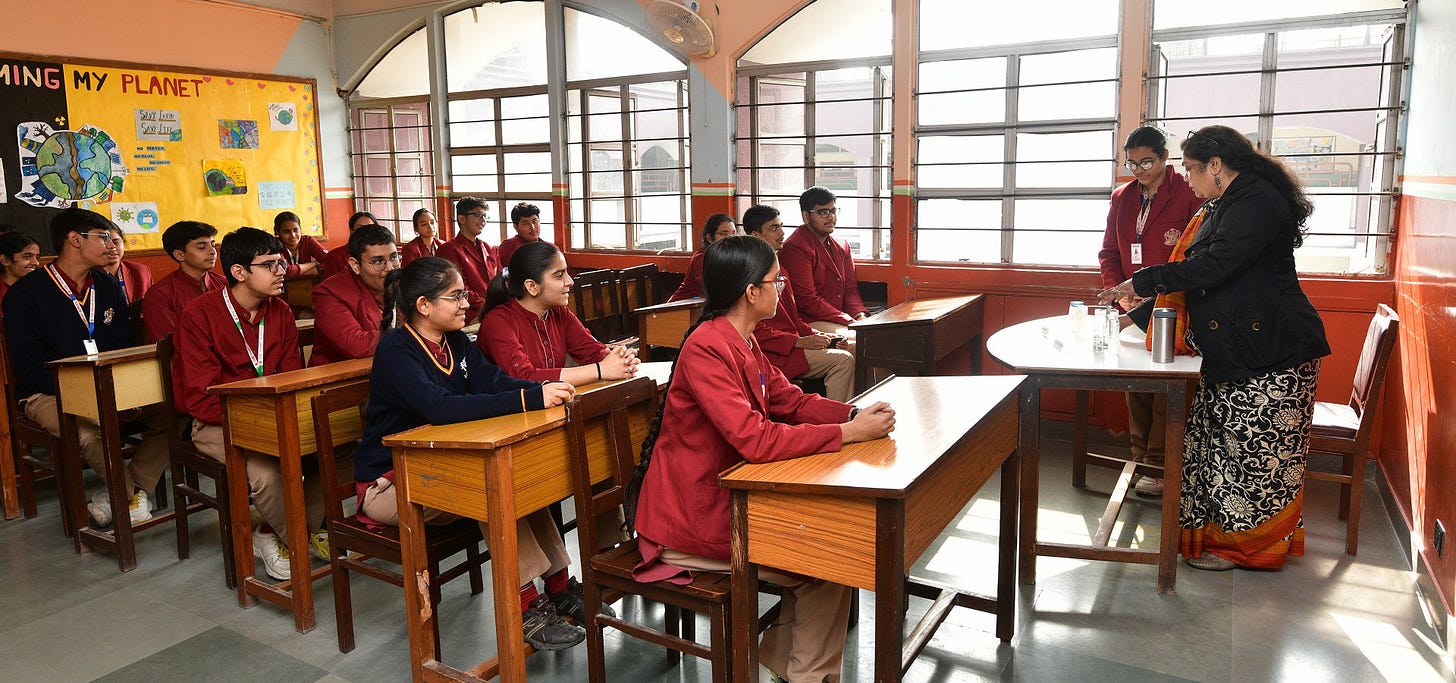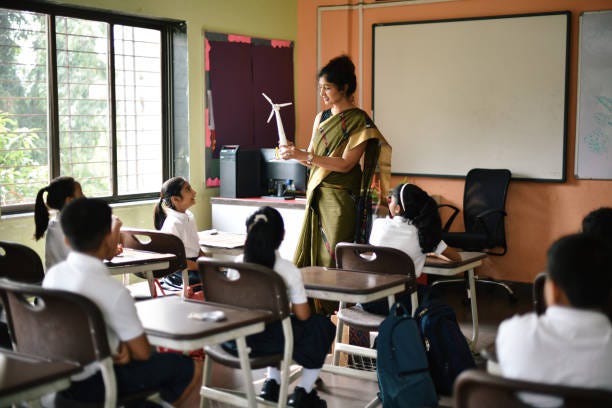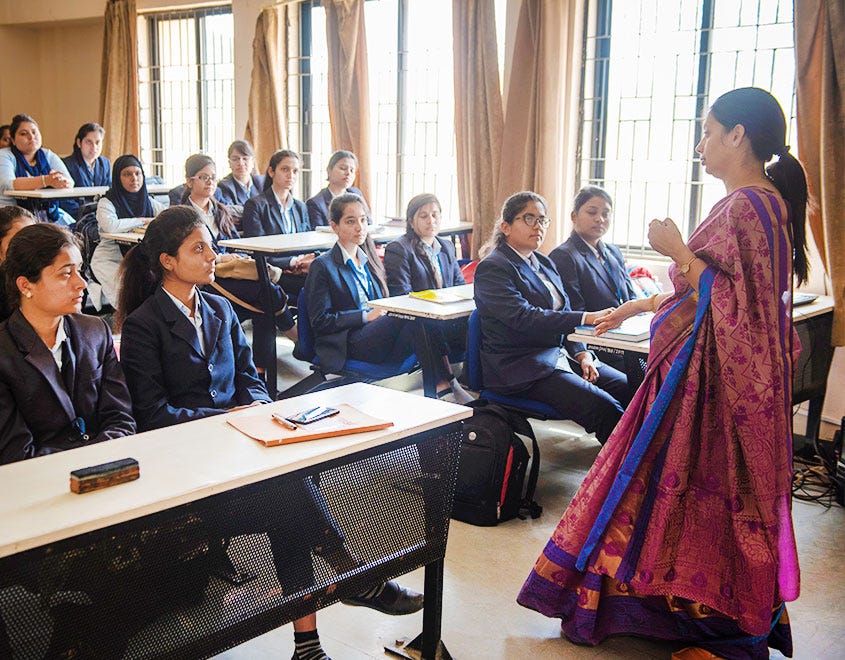Artificial Intelligence (AI) is reshaping education globally, offering innovative solutions to enhance accessibility and inclusivity. In India, where socio-economic diversity, linguistic variations, and varied learning needs pose unique challenges, AI has the potential to create an equitable learning environment. The Indian EdTech market is expected to reach $10.4 billion by 2025, driven by the growing adoption of AI and digital learning platforms. According to a KPMG report, AI-powered learning platforms have demonstrated a 20–30% increase in student engagement and retention rates compared to traditional methods.
India faces a considerable teacher shortage, with a student-teacher ratio of 24:1—higher than UNESCO’s recommended 15:1 ratio. UNESCO also recognises AI-driven solutions as a means to achieve Sustainable Development Goals (SDGs) by 2030. The UNESCO State of Education Report for India, 2022 highlights the National Education Policy (NEP) 2020’s focus on AI literacy, encompassing both technological and human dimensions. The human dimension stresses awareness of AI’s limitations and risks. The report identifies the drawbacks of a one-size-fits-all approach and emphasises the need for intelligent tutoring systems capable of real-time learning assessment.
In 2020, the Central Board of Secondary Education (CBSE) signed a Memorandum of Understanding (MoU) with Intel to develop an AI curriculum framework for students in grades 8–10. CBSE has also collaborated with various corporations to equip students with technical skills, including data analysis and computational thinking.
AI’s Role in Inclusive Education
Personalised Learning Plans
AI enables individualised learning experiences by analysing students’ learning patterns, strengths, and weaknesses. It helps educators track progress and tailor content to learners’ needs. Given India’s high student-teacher ratio, AI-driven personalised learning ensures that students advance at their own pace, easing the burden on teachers.
Assistive Technologies
AI-powered tools like speech-to-text and text-to-speech software support students with visual and hearing impairments. Augmentative and Alternative Communication (AAC) devices help non-verbal students and those with speech disorders communicate effectively, enhancing their learning experience.
Inclusive Content Creation and Accessibility
AI can generate diverse, culturally sensitive educational content suited to India’s multilingual and multicultural context. It can create region-specific illustrations, audio materials, and interactive lessons, making learning more engaging and accessible.
Several India-based companies have developed AI-powered translation tools to improve accessibility:
Project Udaan translates textbooks and study materials into 15 Indian languages.
Devnagri is an AI-powered human translation platform supporting 22 Indian and 10 international languages.
Read Along, an AI-driven app, helps develop reading skills in multiple Indian languages.
Addressing Language Barriers
India’s linguistic diversity presents a challenge to uniform education. AI-powered translation tools and speech-to-text systems help break these barriers by providing real-time translations and transcriptions in regional languages, ensuring students can learn in their preferred language.
Bridging Socio-Economic Divides
AI-driven platforms enhance education equity by offering affordable, scalable learning solutions. Government initiatives like PM eVIDYA and Diksha use AI to deliver educational content to students in remote and underserved areas, bridging socio-economic and geographical disparities.
Challenges in Implementing AI in Inclusive Education
Digital Divide
Many students, particularly in rural areas, lack access to devices, reliable internet, or even electricity, limiting AI-driven education. Addressing these infrastructural gaps is crucial to ensuring AI reaches all learners.
Bias in AI Systems
AI models are only as good as the data they are trained on. If AI tools lack diverse linguistic and cultural representation, they may reinforce biases and exclude certain groups. Ensuring fairness in AI algorithms is critical for true inclusivity.
One-Size-Fits-All Approach
Many AI solutions are designed for global markets and may not be suitable for India’s educational landscape. The lack of localisation can result in tools that do not align with the country’s curricula and cultural contexts.
Quality and Affordability of AI Tools
Advanced AI tools offer promising solutions but are often expensive, making them inaccessible to underfunded schools and economically disadvantaged students. Low-cost alternatives frequently lack the quality needed for effective learning outcomes.
Fragmented Policy Framework
India currently lacks a cohesive policy for AI integration in education. Fragmented efforts and the absence of standardised guidelines hinder the scalability and effectiveness of AI-driven initiatives.
Conclusion
AI has the potential to revolutionise inclusive education in India by offering personalised learning, assistive technologies, and multilingual support. It can bridge socio-economic and geographical gaps, making quality education accessible to all. However, its successful implementation requires addressing challenges such as the digital divide, algorithmic bias, affordability, and policy fragmentation. A collaborative effort among policymakers, educators, and technology developers is essential to harness AI’s full potential in creating a truly inclusive education system.
Resources:
KPMG India. EdTech Market Report 2023.
KPMG India. AI in Education: Enhancing Learning Outcomes, 2022.
Nair, A. “Need for Leveraging AI in India’s Education Sector”, The Hindustan Times, March 2024
UNESCO. AI and Sustainable Development Goals: A Global Perspective, 2023.
UNESCO. State of Education Report for India, 2022.
Central Board of Secondary Education (CBSE). AI Curriculum Framework, 2020.
Project Udaan. Bridging Language Gaps in Education, 2023.
Devnagri. AI-Powered Translation for Indian Languages, 2023.
Google India. Read Along: AI for Literacy, 2022.
Ministry of Education, Government of India. PM eVIDYA and Diksha Initiatives, 2021.




